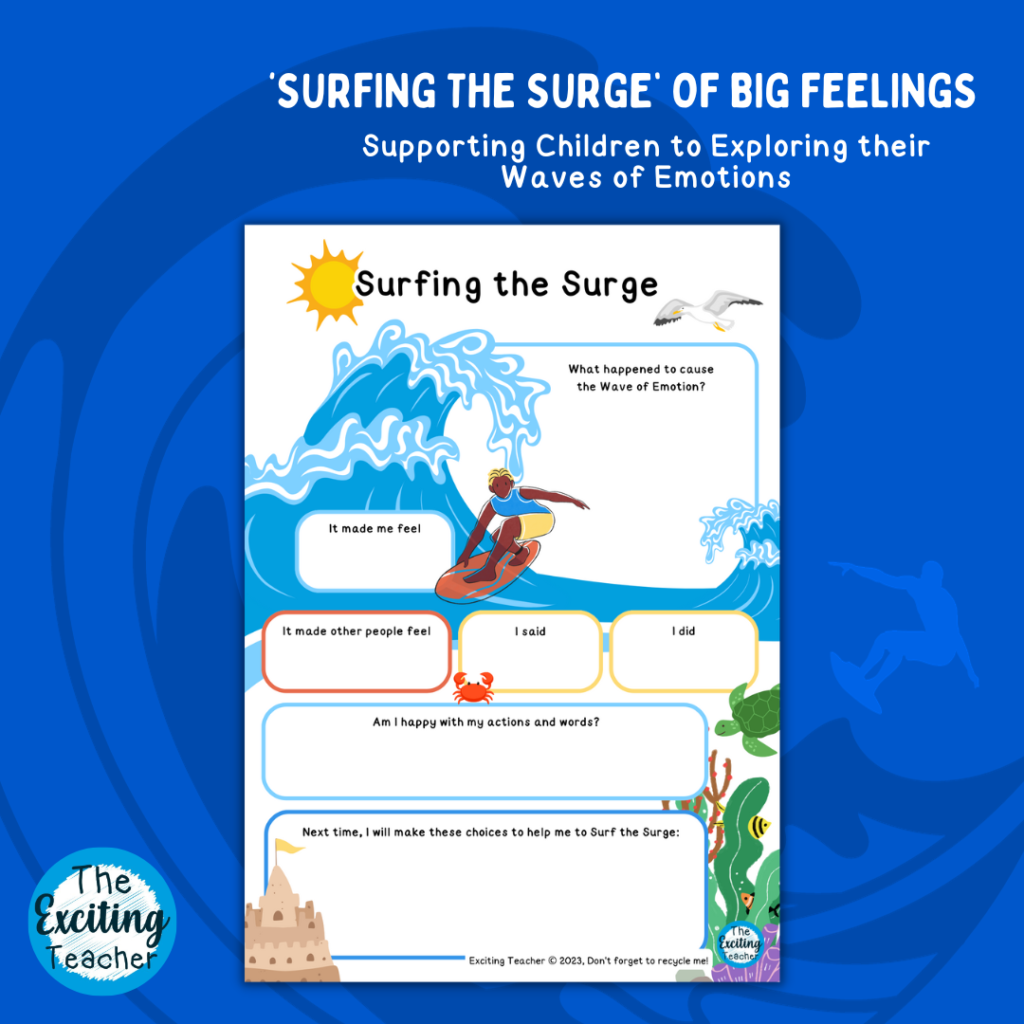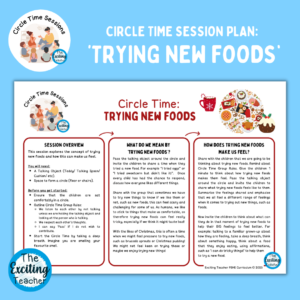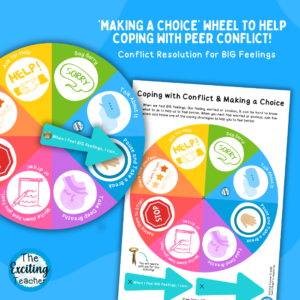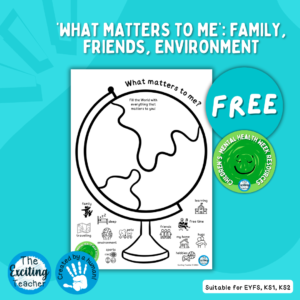'Surfing the Surge' Riding the Waves of Emotion

The ‘Surfing the Surge’ has been designed to support children and young people with choosing helpful solutions when faced with conflict or BIG feelings. This is a Conflict Resolution approach focused on restorative practice!
What happened to cause the Wave of Emotion? How did it make you feel? How did it make others feel? Are you happy with your actions and words? Next time, what choices would you make differently?
How could this resource be used?
- To support emotional regulation & emotional literacy.
- To support conflict resolution.
- To support a child 1:1.
Relevant Curriculum Links:
England PSHE – Which statutory PSHE curriculum* objectives does this resource fall into? *in line with the PSHE Association 2021 Statutory Guidance.
KS1:
- H11. about different feelings that humans can experience.
- H12. how to recognise and name different feelings.
- H14. how to recognise what others might be feeling.
- H15. to recognise that not everyone feels the same at the same time, or feels the same about the same things.
- H16. about ways of sharing feelings; a range of words to describe feelings.
- H18. different things they can do to manage big feelings, to help calm themselves down and/or change their mood when they don’t feel good.
- H19. to recognise when they need help with feelings; that it is important to ask for help with feelings; and how to ask for it.
KS2:
- H17. to recognise that feelings can change over time and range in intensity.
- H18. about everyday things that affect feelings and the importance of expressing feelings.
- H19. a varied vocabulary to use when talking about feelings; about how to express feelings in different ways.
- H20. strategies to respond to feelings, including intense or conflicting feelings; how to manage and respond to feelings appropriately and proportionately in different situations.
- H21. to recognise warning signs about mental health and wellbeing and how to seek support for themselves and others.
- H22. to recognise that anyone can experience mental ill health; that most difficulties can be resolved with help and support; and that it is important to discuss feelings with a trusted adult.
Scottish Health and Wellbeing Curriculum Outcome(s):
- Mental and Emotional Wellbeing:
- I am aware of and able to express my feelings and am developing the ability to talk about them. HWB 0-01a / HWB 1-01a / HWB 2-01a / HWB 3-01a / HWB 4-01a.
- I know that we all experience a variety of thoughts and emotions that affect how we feel and behave and I am learning ways of managing them. HWB 0-02a / HWB 1-02a / HWB 2-02a / HWB 3-02a / HWB 4-02a.
- I understand that there are people I can talk to and that there are a number of ways in which I can gain access to practical and emotional support to help me and others in a range of circumstances. HWB 0-03a / HWB 1-03a / HWB 2-03a / HWB 3-03a / HWB 4-03a.
- I understand that my feelings and reactions can change depending upon what is happening within and around me. This helps me to understand my own behaviour and the way others behave. HWB 0-04a / HWB 1-04a / HWB 2-04a / HWB 3-04a / HWB 4-04a.
- I understand the importance of mental wellbeing and that this can be fostered and strengthened through personal coping skills and positive relationships. I know that it is not always possible to enjoy good mental health and that if this happens there is support available. HWB 0-06a / HWB 1-06a / HWB 2-06a / HWB 3-06a / HWB 4-06a.
More amazing resources you might like:
- All
- Christmas
- Conflict Resolution
- Emotional Literacy
- Emotional Regulation
- Emotions and Feelings
- Goal Setting
- Health and Wellbeing
- Lesson Plans
- Mindfulness
- New Year
- PSHE Curriculum
- Positive Growth Mindset
- School Transition
- Self-Care and Wellbeing
- Self-Esteem
- Self-Love

My ‘Jar of Self-Care’ Activities

Circle Time Sessions: ‘Trying New Foods’ (Lesson Plan) – Christmas Edition

Feeling scared?

Moving to Secondary School: Transition Session 1

I wish my teacher knew…

‘My Goals & Dreams’: Vision Board – Visualisation, Resolutions & Goal Setting

‘Coping with Conflict’ & Making a Choice Wheel

Advent: The ‘Acts of Kindness’ Christmas Tree

Advent: ‘The Problem-Solving Worry Christmas Tree’ Poster

FREE: ‘What matters to me?’ Fill the Globe with Things Important to You Activity (Children’s Mental Health Week 2024 Resources)
Share this resource:
Facebook
Pinterest
Twitter
WhatsApp
Email
Print
Request a Resource
Want to request or suggest a resource? Pop us a message below and we will see what we can do. We are not able to respond directly to all requests but be rest assured, we are reading them and constantly updating the resource bank accordingly to all your fabulous ideas!
